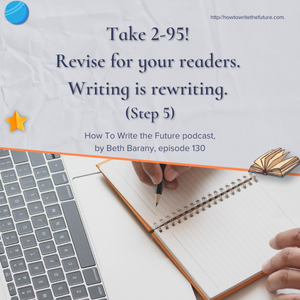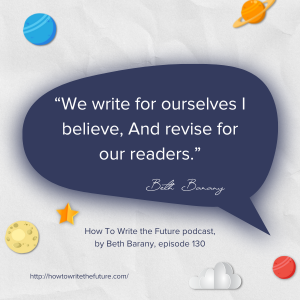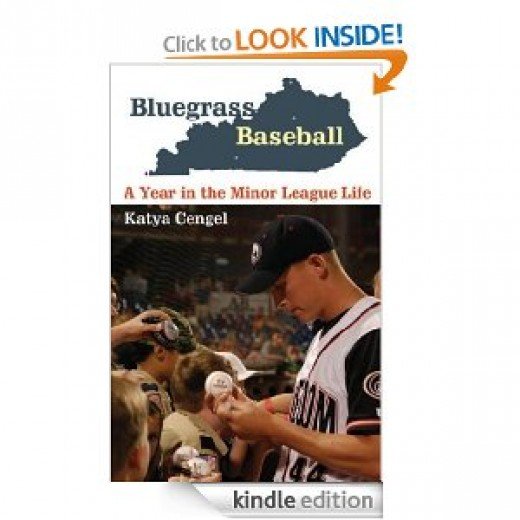Take 2-95! Revise for your readers. Writing is rewriting. (Step 5)
Take 2-95! Revise for your readers. Writing is rewriting. (Step 5) – How To Write the Future podcast, episode 130
“We write for ourselves, And we revise for our readers.”
In “Take 2-95! Revise for your readers. Writing is rewriting. (Trust Your Creative Heart Roadmap, Step 5)” How To Write The Future podcast host, Beth Barany focuses on the art and craft of revising and editing your novel and shares key tips on how to approach your messy first draft, from word choice to pacing, and gives advice on the importance of feedback and finding critique groups.
✅ Sign up and receive a copy of Trust Your Creative Heart Roadmap workbook: https://bethbarany.com/trust-your-creative-heart-roadmap-workbook/

Platforms The podcast is available on Apple Podcasts | Buzzsprout | Spotify | Podcast Addict | Amazon Music | YouTube
RESOURCES
GET HELP WITH YOUR WORLD BUILDING – START HERE
Free World Building Workbook for Fiction Writers: https://writersfunzone.com/blog/world-building-resources/
Get support for your fiction writing by a novelist and writing teacher and coach. Schedule an exploratory call here and see if Beth can support you today: https://writersfunzone.com/blog/discovery-call/
About the How To Write the Future podcast
The *How To Write The Future* podcast is for science fiction and fantasy writers who want to write positive futures and successfully bring those stories out into the marketplace. Hosted by Beth Barany, science fiction novelist and creativity coach for writers. We cover tips for fiction writers. This podcast is for readers too if you’re at all curious about the future of humanity.
This podcast is for you if you have questions like:
– How do I create a believable world for my science fiction story?
– How do I figure out what’s not working if my story feels flat?
– How do I make my story more interesting and alive?
This podcast is for readers too if you’re at all curious about the future of humanity.
Transcript for Take 2-95! Revise for your readers. Writing is rewriting. (Step 5)(Trust Your Creative Heart Roadmap)
BETH BARANY: Hey everyone. Welcome back, or welcome to How to Write The Future Podcast. In this series. I am talking about my Trust Your Creative Heart Roadmap. This roadmap is for science fiction and fantasy writers who want to go from idea to published and finished and polished novel that they are super proud about.
[00:22] Step 5: Revising and Editing: Take 2 to 95
BETH BARANY: This week, I’m talking about Step Five, revising and editing. I call it Take 2 to 95. Yes, there could be many revisions to your novel, and that is entirely normal and entirely okay.
So today I’m going to share with you a few key tips to revising your novel. Now you’ve written a complete, let me say again, complete first draft. It’s messy. A lot of things need fixing and that’s okay.
That is what this stage is all about. Now I’m somebody who tends to write fast and edit slow. Not everyone is like that. Some people are slow writers and so editors or some people uh, write very, very slowly and come up with very clean material and then the editing process goes fairly quickly.
There is no right way to go about revising your novel. There’s only the way that works for you.
Now if you’ve never edited a first draft, it’s going to be all completely new and that’s okay. That means it’s a process of discovery to figure out what works for you. And the only way to figure out what works for you is to dive in there and start.
[01:42] Try on this frame of mind
BETH BARANY: So this frame of mind might help you.
We write for ourselves, I believe. And we revise for our readers.
So editing, editing and revising, I use interchangeably. They are, to me, the same thing. lots of different parts are involved and editing and revising. It’s not just grammar or typos or spelling. It’s word choice, sentence structure, making sure the characters feel three-dimensional. That’s a whole thing, making sure the setting comes alive, and that’s a whole thing, making sure your pacing is good, making sure you’re meeting and exceeding reader expectations. All of that is part of editing.
[02:24] The Art and Craft of Editing
BETH BARANY: So a big part of editing and revising one’s novel is about learning and deepening into the craft of writing, both the story development side. And the craft of stringing words one after another and putting them in a certain order so that when your reader reads your book, they forget they’re reading.
It’s amazing. It’s like magic, but it’s actually a craft and it’s an art. We are artists. You’re going to revise your book for your reader.
And so this is something very interesting when we start to edit. We are writers and we are readers. So when we look at our work, we want to look at it and imagine what it might be like to read it as a reader, not as a critical writer who’s thinking about craft. Or how another writer might look at your work.
You actually want to also learn how to put on that hat of the reader. a prerequisite to being able to be a good writer, not only is writing a lot, but reading a lot. So make sure you are reading a lot in your genre, outside of your genre, across the board. Be reading.
Now, as I said, we revise for your readers.
So learn how to put on the readers hat.
Writing is rewriting. So get comfortable with the fact that you might throw things out and rewrite sentences. The idea might stay the same, but how you phrase it might be different. We’re really deepening into the art and the craft of: how do you put a story together? And editing a novel is in itself, its own art and craft.
[04:00] Giving and Receiving Feedback
BETH BARANY: And then lastly, a big part of the editing process is learning how to give and receive feedback. You want to find a place where you feel safe, where you feel comfortable, and where you feel on the same wavelength with other writers to be able to give and receive feedback. This is best done in a peer group of some kind. Either in person or online or on zoom. And there’s a lot of resources out there on how to find good critique groups.
And if you need help with that, be sure to let me know, and I have resources.
[04:34] Questions to Guide Your Editing
BETH BARANY: Now as you deepen into your editing process and get in there and start making changes on your work, I want you to ask these two questions. And these are two questions that I ask at every step of the way, which is:
One: what’s working? What’s working for you?
For example, when I first started editing my very first novel, I actually was in a critique group, on purpose, so I could get things written and get things critiqued along the way. And that was definitely what was working for me. It really pulled me along and taught me a lot about writing.What’s also working is that I am still in a critique group, both my husband and I are in critique groups and have been in different groups off and on since the very beginning.
In fact, we met each other in a critique group and we are each other’s critique partners. Very unusual. I know, but it’s quite a, it’s quite wonderful. It’s quite a blessing.
That’s what’s working well for me. and I know that I can get people to look at my work at different stages and get feedback, and that helps me improve as a writer. And I’m always improving as a writer.
And that’s what I noticed also about all the writers I’ve ever met is nobody just says, oh, I know this. And that’s it. There’s nothing more to learn. What I noticed is writers are always learning. That’s actually one of the, maybe a distinguishing feature for writers is we’re always learning. We’re always growing. And editing is a great phase in the writing process to be doing that in.
The second question is what would you like more of? Maybe you would like critique, you would like feedback. Or you would just like to be able to read your work aloud, and have someone listen and nod and say thumbs up, which is also something we do actually during the writing process, but you could also have that kind of support in the editing process.
Or maybe what I noticed with writers working on their work, sometimes they don’t want to show their work to anyone until they feel ready, but they definitely want to announce that they’re working on their book.
Do you have people that you can share the success of the fact that you’re making progress in your edits? That could be your friends and family, that can be online. That could be an email list.
So think about what it is that you would like more of.
Recently I’m revising a novel and I came to a place where I felt ready to share the first few chapters with my beta readers. So what I wanted more of in that moment is I want to know how close to being done is this book. After having gone through many revisions. So I put out a request to my beta readers that I have been cultivating for years. And that’s what I needed in that moment.
And so I asked for it.
So when you notice what you would like more of articulate it as a request and see if there’s someone that you can ask that of. And if you’re not really sure, go ahead and ask me. I, and if I don’t know the answer, I will go and find out where you can get that resource. And I know a ton of other writing teachers who might be a resource for you. I know of a lot of resources.
So one of the things that I really enjoy is being a resource for others.
[07:29] Conclusion and Next Steps
BETH BARANY: All right, that’s it for this step. Step number five, which is Take 2 to 95, Revise for your readers and Writing is Rewriting.
So join me for Step Six. Can you believe it? We’re already on Step Six. And I’m going to talk about marketing because I’m actually encouraging writers to start thinking about their marketing really early in the process. And during their editing, especially.
[07:57] Workbook
BETH BARANY: And just so you know, there is a little workbook that comes with the series.
So be sure to check that out in the link, or go ahead and put into the comments, if you’re listening to this on YouTube and say, “Send me the workbook.” There is a workbook that comes along with this roadmap.
All right. That’s it for this week, everyone write. Long and prosper.
Loved this episode? Leave us a review and rating here:
https://www.buzzsprout.com/2012061
Need instructions on how to leave a review? Go here.
ABOUT BETH BARANY
Beth Barany teaches science fiction and fantasy novelists how to write, edit, and publish their books as a coach, teacher, consultant, and developmental editor. She’s an award-winning fantasy and science fiction novelist and runs the podcast, “How To Write The Future.”
Learn more about Beth Barany at these sites:
Author site / Coaching site / School of Fiction / Writer’s Fun Zone blog
CONNECT
Contact Beth: https://writersfunzone.com/blog/podcast/#tve-jump-185b4422580
Email: beth@bethbarany.com
LinkedIn: https://www.linkedin.com/in/bethbarany/
IG: https://www.instagram.com/bethbarany/
TT: https://www.tiktok.com/@bethbarany/
FB: https://www.facebook.com/bethbarany
X: https://twitter.com/BethBarany
CREDITS
- EDITED WITH DESCRIPT: https://www.descript.com?lmref=_w1WCA (Refer-a-Friend link)
- MUSIC CREDITS : Music from Uppbeat (free for Creators!): https://uppbeat.io/t/soundroll/fuzz-buzz License code: UMMKDRL02DFGKJ0L. “Fuzz buzz” by Soundroll. Commercial license: https://musicvine.com/track/soundroll/fuzz-buzz.
- DISTRIBUTED BY BUZZSPROUT: https://www.buzzsprout.com/?referrer_id=1994465 (Refer-a-Friend link)
- SHOW PRODUCTION BY Beth Barany
- SHOW CO-PRODUCTION + NOTES by Kerry-Ann McDade
C 2024 BETH BARANY
For more “How To Write the Future” episodes, go here.
If you’d like to invite Beth onto your podcast, drop her a note here.
✅ Like the work we do? Tip us! https://ko-fi.com/bethbarany






